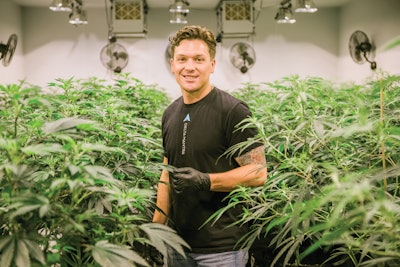
All cultivation outfits encounter challenges. From build-out blunders to permit problems, there’s no telling what issues a grower might be staring down when he or she gets out of bed each day. Some, however, face bigger hurdles than others. Delta Mantra, an indoor grow operation in Portland, Ore., and its owner/CEO, Jay Ponciano, know this all too well.
Ponciano went back-and-forth with the city of Portland for all of 2017 to mid-2018, navigating administrative red tape for more than a year trying to obtain the proper permits. The city was threatening to shut them down. The landlord was threatening to kick them out. Ponciano was at a loss; the situation was bleak. Then things got worse.
As Ponciano was racing the clock to obtain permits and prevent a shutdown, Delta Mantra was robbed—its entire inventory ($129,000 worth of product) gone. The robbery forced Ponciano to temporarily close Delta Mantra, but it did not deter his resolve. He was determined to make the cultivation company a success. Here, Ponciano shares the torrid details of the convoluted permit process he endured, how he recovered from the robbery and dealt with the effects it had on the business, and, despite its rocky start, why Delta Mantra is positioned to set a standard for future cultivation facilities across the country.
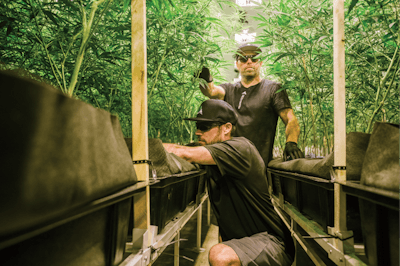
Scott Guthrie: Prior to launching the business, you spent a few years touring other facilities to better understand the industry and cultivation. What have you learned and incorporated at Delta Mantra?
Jay Ponciano: Anyone who chooses to start a commercial grow operation should tour as many grows as possible. We learned something new every time we were able to tour a facility. I’d always ask, “If you had to redo your build-out, what would you change?” I think that’s a great question—you can quickly learn from other people’s mistakes or about some things that may have caused inefficiencies.
The biggest issues I saw when touring other facilities always came down to climate control and space usage. You have to make sure your HVAC system can handle the amount of lights you’re running as well as have the proper dehumidification. I recommend having an electrician review your load calculations to make sure all the equipment you have will work the way you want it to.
We designed our rooms so that there really isn’t any wasted canopy space. We do that using sliding tables, but our rooms were designed to be able to handle all those items I discussed above. If those items aren’t addressed, farms will be running into issues that could range from molds and mildews to stressed out plants.
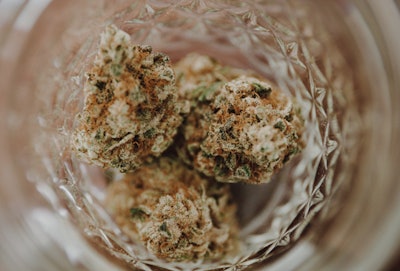
Guthrie: You played baseball at Washington State. How did your experience as a college athlete prepare you to lead Delta Mantra?
Ponciano: Playing baseball at a high level helped set me up for success off the field. I played catcher at Washington State, so it was my responsibility to make sure I was getting the most out of our pitching staff, and that our defense and I were always on the same page. With that said, I don’t think there’s a better position in sports that can prepare an individual for the business world.
I take the same philosophy with my team here, essentially, that I did with my baseball team, and that’s doing whatever it takes to set up each individual to be as successful as possible, and to work to create a team atmosphere. You have to have [a team atmosphere] at the farm if you want things to be running right.
Guthrie: You had difficulties obtaining permits through the city of Portland. What happened when you were opening, and how did you get it resolved?
Ponciano: Getting permitted in the city of Portland has been quite the process. We submitted our project in January 2016. Our plans were approved for the full build-out that we wanted, which included more rooms than what we have now, but with the delays we were experiencing, we were forced to phase the project out.
I said, “Let’s cut back the project, just build out a couple rooms, get licensed.” [By] June 19, 2017, we had our Phase 1 [complete]. We got approved by the Oregon Liquor Control Commission (OLCC), and on that date, I was told we were OK to bring in plants and to begin operating.
While we were doing that, we were working to finish the requirements that the city of Portland (known as BDS (Bureau of Development Services)) had for us. One item that was frustrating was, after plans were approved, my contractor told us [BDS was requiring that we install economizers in our HVAC system to allow airflow in and out of the rooms], and that was the only way we’d get permitted. That was an additional $18,000 [expense] out of nowhere.

There were delays in getting that equipment ordered, but [then there were] the things that you have to go through, like installing handicapped parking spaces, new trees, plants, bike racks—just tons of stuff I had no idea I was getting myself into to comply with the city. So, we’re doing everything we can to get our final permit as timely as possible, but on Sept. 15, 2017, I receive a letter from ONI (Office of Neighborhood Involvement) stating that we were operating without our final MRL (Marijuana Regulatory License). They gave me notice that in 90 days, if we did not have our approved permit, we would be facing a $5,000 fine.
I notified everyone involved in the project. Nobody thought it’d be an issue. We were under the assumption we didn’t have to resubmit the drawings of [fewer] rooms because all we did was just reduce the number of rooms. You could red-line them out. But on Dec. 12, 2017, ONI came [for the inspection, and] I got hit with a $5,000 fine.
We were unable to meet the deadline because the final inspector who looked at the plans said [we needed to resubmit the plans showing fewer rooms]. So, on Jan. 1, because ONI hit us with the fine, they also notified our landlord. I got a letter from the landlord requesting [that we] remove all of our product and plants from the building or there would be legal action taken against us. I was caught in a position where I’m like, “We need to continue to operate.”
I can’t just remove everything while I’m waiting for the city to review these two rooms, to get signed off by Fire & Life Safety—they were the last inspector. On Jan. 18, I get a response from Fire & Life Safety thinking we’re good to go, but come to find out, because of the … rooms we didn’t build out, city code required an additional fire door or fire corridor hallway. That’s when I was like, “I don’t think we’re going meet our deadline.”
On Jan. 23, I get another notification from ONI that they’re going to inspect us again on Jan. 26. I realized we wouldn’t have our final approved permit from BDS by that inspection date. On that day, I called some wholesalers to let them know, “Hey, I got to get my entire inventory out of here legally.” But the very next day, I came to work to find our entire inventory had been stolen. [More on this later.] [I was forced to] shut the business down and tried to figure out a way to bounce back.
On May 24, we finally were able to receive our MRL because we did all the mandatory licensing, we built out an additional fire corridor. As you can imagine, it felt like we were trying to do everything we could to be legal, and then [we were] put in a situation that put us in a very vulnerable spot.
Guthrie: Where is Delta Mantra now in terms of recovering from the robbery from an operational standpoint?
Ponciano: Getting robbed was absolutely devastating. Here I was, threatened of getting shut down by the city, the landlord—I’m under a lot of heat. The day before we lost everything, I was trying to call other licensed wholesalers to explain the predicament we found ourselves in.
We would’ve legally been able to transfer all our product to another licensed wholesaler, and they could’ve sold it for us, so we could’ve still had a revenue stream. Instead, I woke up the following day—it was the 24th of January, 6 a.m. My mom [was on the phone], [and] I could hear it in her voice. She was struggling to tell me what had happened. She said, “The cops are here at the farm. Everything is gone.”
As a startup company and entrepreneur, the odds are against you. But after this, I was forced to lay off 12 employees immediately, so it affected many families and their household income. In a way, you feel like you let everyone down. I know I didn’t, but it gets at you.
In about 18 minutes, someone was able to take away everything we’d been working for. I called our security company to find out why no alarms went off. They notified us that our surveillance—our internet connection—went down. But after their investigation, [it was discovered] they didn’t install the motion detectors that we paid for.
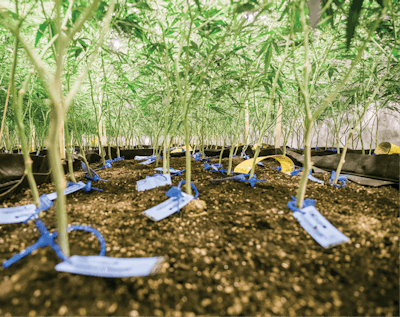
Guthrie: Why did you decide to persevere through these setbacks rather than close the business permanently?
Ponciano: Everyone involved in this project has made countless sacrifices. When I was getting this thing rolling, I sold my condo. I gave up a nice, six-figure position in the health care industry a few years ago to start this company. I’ve been through the ringer. I’ve stayed on friends’ couches. I’ve taken as little as possible from the company while we’re in startup mode.
Once you’ve made these types of sacrifices and you’ve gotten the people involved to make them as well, you’re like, “I don’t care what comes at me. I’m willing to do whatever it takes to get us back on our feet,” and so are the people that we chose to start this company with. I don’t surround myself with quitters.
I think you have to be a little crazy to be an entrepreneur. You have to be relentless and literally refuse to take “no” as an answer. When I was raising funds to help start this dream, I talked to as many people as I possibly could. I tried to sell them not only on the vision, but on myself and who they’re trusting with their money. I just have that determination to be successful and to take care of shareholders and my employees before myself.
[After the robbery], our board got together, and we discussed all our options. We were so close to the finish line with permitting and had that taste of success, so we decided to not throw in the towel. We still have multiple years on our current lease, and we want to see the vision through.
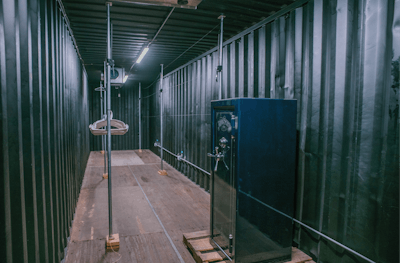
Guthrie: As you’re going through this, do you ever think you made a mistake by entering the cannabis industry?
Ponciano: We knew that this project wasn’t going to be easy. Oregon is a free and open market, so [there were] risks before we even started. Right now, it’s difficult to move all the product that the state of Oregon has produced, but we’re confident that if we continue to grow our top-shelf indoor cannabis with the consistent test results we were receiving before we shut down, the consumer will continue to demand our product and our brand.
We’re hoping that in the future we’ll be able to move product into the other states that have a higher demand. The West Coast has always kind of been the producer coast, and [we envision that it will] continue to be that down the road.
Guthrie: What advice would you give to other growers who are currently struggling with administrative red tape?
Ponciano: Do what I did, and ask for help and network as much as possible. Get involved with local groups and attend meetings or seminars discussing challenges the industry is facing. Get to the bottom of what is being required by all agencies involved, and try to understand as much of the project as possible.
You’ve got to hold people accountable for getting their work done and getting it done right. I’d also recommend finding a helpful mentor or somebody that’s already done it, or even just hire a consultant who’s been through it before. I think it’d be worth spending a few grand, whatever it might be, to help save you some big bucks in the long run.
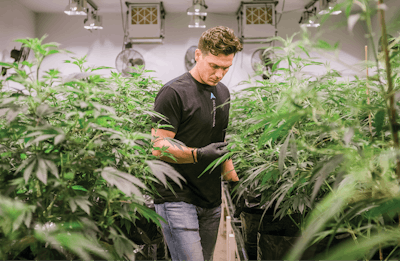
Guthrie: What makes your lighting and climate control state-of-the-art, and why is it important to stay ahead of the curve when it comes to new growing technologies and methods?
Ponciano: In this industry, you have to continuously keep your mind open to different methods and innovation. With prices falling, we had to figure out a way to continue growing in soil while shaving off some expenses and increasing quality. We’ve gone to a no-till soil bed system that allows us to recycle our beds through multiple harvests during the year. It’s more expensive up front, but in the long run, we’re going save a lot more rather than potting plants and tossing the soil away after they’re chopped down. We’re able to reuse these soil beds, and they get better over time.
Our lighting and climate control is completely automated. We control our lights with sunrise and sunset modes to replicate Mother Nature. We invested a ton into our HVAC system. It understands what time our lights turn on and off, so it adjusts how much cool air is brought in to maintain consistent room temps.
We check those temps and humidity, the high/low ranges, daily to see if anything weird happened overnight. We’re finding consistent ranges daily. So, it’s a lot easier to make any adjustments needed, but if you don’t have those things under control—and we’ve been to farms that don’t—that’s when you start seeing a lot of the problems with product.
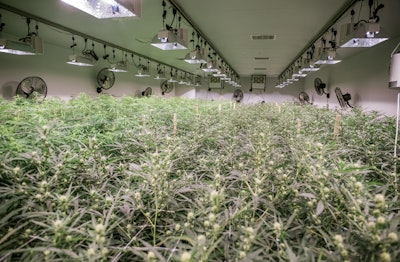
Guthrie: Can you talk about the advantages of using compost teas, and what beneficial insects you’re deploying?
Ponciano: We’re all about the compost teas for a couple reasons. … Everything that we put in our plants, I would put in my body.
The teas go hand-in-hand also with our no-till soil recipes. They’re organic, so we’re able to brew up exactly what the plants need during any phase of their life cycle. Toward the end of the life cycle in the late flower stage, we’re brewing up sugars and molasses. So, we’re giving [the plants] some additional sugars toward the late flower stage.
For IPM [integrated pest management], we use essential oils like lavender, peppermint, eucalyptus—again all organic. Fortunately, we don’t have pest issues right now. We also add beneficial insects like cucumeris [mites], those are for eating thrips and [other] mites. We add Hypoaspis miles, and those are soil-dwelling mites that eat root aphids and fungus gnat larvae. So, that’s what those help fight off, and [we add] predatory nematodes. We mix those into our compost teas; and when we’re watering the plants, they help fight off any soil-dwelling pests.
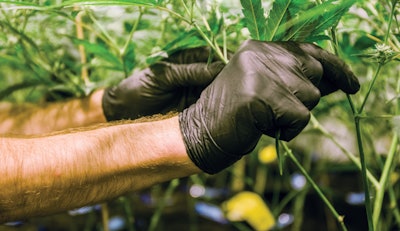
Guthrie: Your website states your “environmentally conscious approach to high-quality cannabis production will set the standard for future facilities.” How so?
Ponciano: I am passionate about the way we do things. … People have noticed how we do things here. I think they’re also seeing how much more sustainable the farm is with our methods, the no-till, brewing our own teas.
There’s a lot of struggling farms [in] Oregon, and we see ourselves as a strong company that could come in and help implement our processes and techniques. By that, I mean I see a lot of consolidation happening in the future. We’re working with a large group, and we see expansion here within a year for us, taking over an additional farm because of our sustainable, organic processes.
















